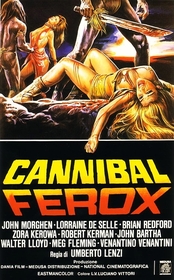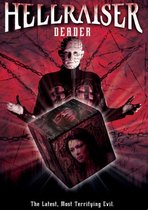Our editor-in-chief Nate Yapp is proud to have contributed to the new book Hidden Horror: A Celebration of 101 Underrated and Overlooked Fright Flicks, edited by Aaron Christensen. Another contributors include Anthony Timpone, B.J. Colangelo, Dave Alexander, Classic-Horror.com's own Robert C. Ring and John W. Bowen. Pick up a copy today from Amazon.com!
Cannibal Ferox (1981)
Cannibal Ferox (1981) is what could be the 'last great' or 'last worst' film in the popular catalogue of Italian cannibal films. It is often a contender with Ruggero Deodato's repulsive Cannibal Holocaust as the most revolting film ever made. While neither of them have any right to that title, they are both two of the worst good films ever made. While Cannibal Ferox may not be everyone's idea of a good time at the movies, it is one of the grimmest, most harrowing horror films ever made.
Cannibal Ferox follows a group of college students who set out in the Amazon jungle in search of a tribe of alleged cannibals. The heroin, Gloria Davis, played by dark-eyed Lorraine de Delle, is writing a thesis that alleges that cannibalism was a myth perpetrate by the white man, as an excuse to take native lands. She has dragged her brother Rudy (Danilo Mattei) and her girlfriend Pat, played by Italian pin-cushion Zora Kerova, along on this crazy adventure.
Things start out bad with a broken jeep, and get worse when they meet up with Mike Logan. Mike is played with a viscous, frightening intensity by Giovanni Lombardo Radice. Under his pseudonym John Morgan, Radice has died some of the goriest deaths in Italian cinema. In Ferox, he doesn't disappoint. His manic, coked-up performance is dubbed with the kind of profanity David Mamet would admire. It over the top, hilarious, and frightening.
The characters get themselves in predictable trouble with the natives, and Gloria gets to ultimately discover the truth of her thesis. The screenplay takes itself seriously enough to do justice to the theory, and draws stark parallels between the white conquerors of old, and the behavior of it contemporary characters.
The cannibal's themselves are not the whopping, ape-like sub-humans of Cannibal Holocaust. Lenzi presents them as ominous, foreboding figures who take their grim retribution in a cold, almost mournful, fashion.
Cannibal Ferox holds up well on its own merits. It a tight, suspenseful story that generates a serious feeling of dread. The jungle, filmed on location in South America, is not presented as lush and beautiful. Instead, it is dense, claustrophobic, and lethal. It has its odd segments, the New York sub-plot, the singing-in-the-cave scene, but ultimately it rivets you to your seat, dreading what will happen next.
Cannibal Ferox plays at times like a cross between Lucio Fulci's Zombie and Cannibal Holocaust. It's grisly, realistic effects were created by Gino di Rossi, son of italian make-up artist Gianetto. They are gruesome, and Lenzi lets his camera linger on them long enough to get under your skin. He doesn't rub your nose in it like the zoom-happy Fulci. He lets you get a good look at the savagery, then cuts to the reactions of his surviving victims. The effect is both repulsive and involving.
Of course, the most revolting aspect of Ferox, as well as any number of its contemporary cannibal epics, is the real animal slaughter it presents to the viewer. Its not as gleefully presented as it is in Cannibal Holocaust, but it still makes for some unsettling viewing.
Ultimately, Lenzi doesn't present his film as 'entertainment'. It's too slow and deliberate for the hard-core gore fans. Instead, he had made a nerve racking film that truly horrifies. It may end on an ironic, almost fatalistic note, but his real aim is to frighten and unnerve, and he does so brilliantly.








